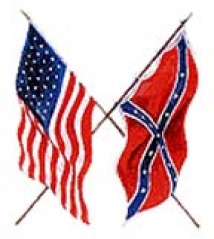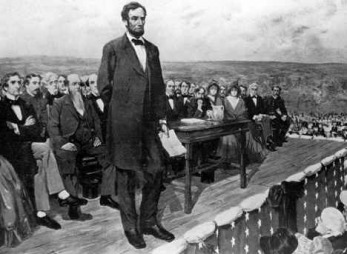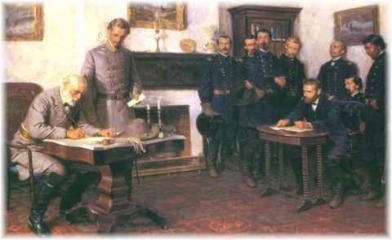The Civil War
After the Southern states seceded, President Abraham Lincoln of the North took no immediate action, stating simply that the secession of the South was illegal. He refused to go to war with the Confederacy, but promised that he would defend all federal property. When the Confederacy attacked the Union controlled Fort Sumner, the Union retaliated, thus marking the beginning of the American Civil War.
As displayed by this excerpt of a letter from Abe Lincoln to Jefferson Davis, slavery was a heated issue between the North and South, even during the Civil War.
"If I can save the Union by saving slavery, I am also bound not to suffer the ruin of those, without whom slavery would not exist. If you likewise desire to save the Union by saving slavery, I am sure that between us both the work will succeed. If, therefore, you contend against me, you are at bottom my rival for the rescue of the Union, and as such, I must spare you. If the Constitution is the basis on which we can join hands in saving the Union, you need only alter your Constitution a little, or take in hand the execution of ours, and all difference is at an end. If I contemplate the possibility of the destruction of slavery by the war, I see that in such a case the clauses of the Constitution which relate to that institution would have no longer any sense or significance, and that, consequently, the Constitution cannot endure without slavery.If the Constitution depends on slavery, and the Union on the Constitution, it follows that the Union can as little endure without slavery as the Constitution. If I seek to save both without “ideas,” I am all the time sticking to the legal path."
- Excerpt from a letter from Abraham Lincoln of the Union to Jefferson Davis of the Confederacy in September of 1862
- Excerpt from a letter from Abraham Lincoln of the Union to Jefferson Davis of the Confederacy in September of 1862
The Gettysburg Address was a unifying speech delivered by Abraham Lincoln during the Civil War. Although brief, it firmly established the Union's support for emancipation, and ultimately led the Union army to victory over the Confederates.
"Four score and seven years ago our fathers brought forth on this continent, a new nation, conceived in liberty, and dedicated to the proposition that all men are created equal.
Now we are engaged in a great civil war, testing whether that nation, or any nation so conceived and so dedicated, can long endure. We are met on a great battlefield of that war. We have come to dedicate a portion of that field, as a final resting place for those who here gave their lives that that nation might live. It is altogether fitting and proper that we should do this.
But in a larger sense, we cannot dedicate - we cannot consecrate - we cannot hallow - this ground. The brave men, living and dead, who struggled here, have consecrated it, far above our poor power to add or detract. The world will little note, nor long remember, what we say here, but it can never forget what they did here. It is for us the living, rather, to be dedicated here to the unfinished work which they who fought here have thus far so nobly advanced. It is rather for us to be here dedicated to the great task remaining before us - that from these honored dead we take increased devotion to that cause for which they gave the last full measure of devotion - that we here highly resolve that these dead shall not have died in vain - that this nation, under God, shall have a new birth of freedom - and that government of the people, by the people, for the people, shall not perish from the earth."
Abraham Lincoln - Gettysburg Address, November 19, 1863
Now we are engaged in a great civil war, testing whether that nation, or any nation so conceived and so dedicated, can long endure. We are met on a great battlefield of that war. We have come to dedicate a portion of that field, as a final resting place for those who here gave their lives that that nation might live. It is altogether fitting and proper that we should do this.
But in a larger sense, we cannot dedicate - we cannot consecrate - we cannot hallow - this ground. The brave men, living and dead, who struggled here, have consecrated it, far above our poor power to add or detract. The world will little note, nor long remember, what we say here, but it can never forget what they did here. It is for us the living, rather, to be dedicated here to the unfinished work which they who fought here have thus far so nobly advanced. It is rather for us to be here dedicated to the great task remaining before us - that from these honored dead we take increased devotion to that cause for which they gave the last full measure of devotion - that we here highly resolve that these dead shall not have died in vain - that this nation, under God, shall have a new birth of freedom - and that government of the people, by the people, for the people, shall not perish from the earth."
Abraham Lincoln - Gettysburg Address, November 19, 1863
"...there is nothing left me but to go and see General Grant. ...I know they will say hard things of us; they will not understand how we were overwhelmed by numbers; but that is not the question, Colonel; the question is, is it right to surrender this army? If it is right, then I will take all the responsibility. ...Men, we have fought through the war together; I have done my best for you; my heart is too full to say more."
- General Robert E. Lee, discussing the fate of the Southern Army
- General Robert E. Lee, discussing the fate of the Southern Army
On April 9, 1865, General Robert E. Lee and the Confederate army surrendered in the Appomattox Court House, Virginia.



